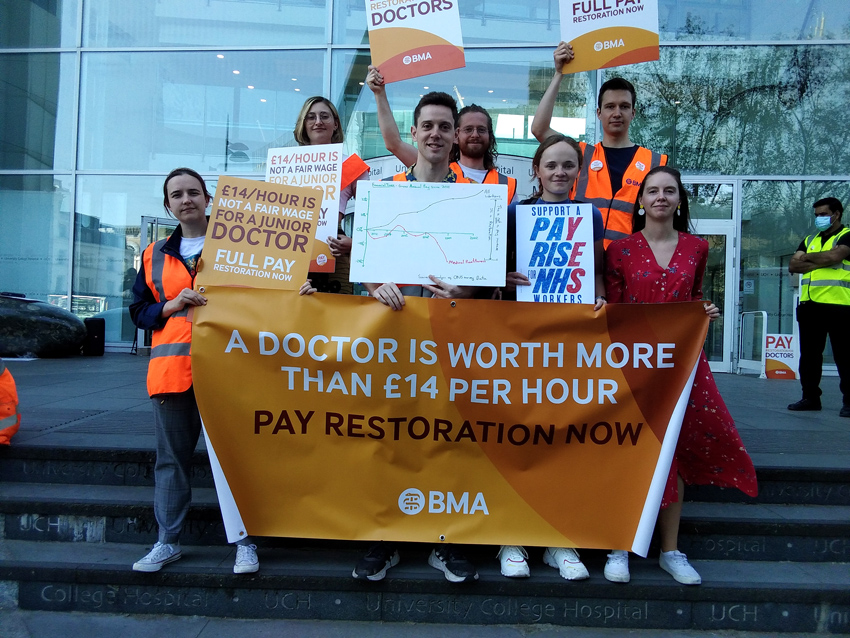AMID a heatwave in the heart of London, hundreds of junior doctors converged at Tavistock Square for a march from BMA House to Parliament Square.
This demonstration was part of an escalating three-day walkout orchestrated by the junior doctors under the British Medical Association (BMA), signifying their increasing discontent over NHS cuts and privatisation.
The young medics, fresh from their pickets, voiced their concerns and frustrations, openly discussing the slow disintegration of the NHS.
Public support for their cause was unmistakable, with constant honks from passing cars and cheers reverberating around the bustling streets of London.
Vivek Trivedi, co-chair of the BMA junior doctors committee, shed light on the current predicament in an interview with News Line. ‘The offer the government has put on the table represents a pay-cut in real terms,’ he said, emphasising the doctors’ unity in their frustration with the government’s offer.
Trivedi stressed the necessity of their actions, mentioning the concerning trend of doctors exiting the NHS system to work abroad due to continuous pay cuts over the last 15 years.
‘Time-critical care has been delayed for thousands of patients,’ he stated.
Trivedi also mentioned the potential for escalated strike action, alongside strong support from other healthcare professionals.
‘If there is any sort of coordination with other striking workers that we can carry out that can increase our leverage and in line with patient safety, we would carry it out,’ he stated.
‘What we’ve seen in our first three rounds of action is continued support from consultants, and other senior doctors, in fact, all of the medical staff in the NHS, which has made it possible for us to take industrial action.’
During the march, several doctors echoed Trivedi’s concerns.
Dr Rachel Antony noted, ‘We are witnessing the slow disintegration of the NHS.
‘This once proud public service is being fragmented and sold off to private entities.’
Similarly, Dr Sudipta observed, ‘The junior doctor strikes and the struggle of the nurses are the manifestations of the discontent against the privatisation of the NHS.’
Both Antony and Sudipta argued for a reversal of NHS funding cuts, full renationalisation of the NHS, and an above-inflation pay rise for all NHS staff.
Addressing the Shadow Health Secretary, Wes Streeting’s plan for the involvement of the private sector in the NHS, Dr Sudipta retorted, ‘Privatisation isn’t a solution, it’s part of the problem.’
The demonstration drew attention to the junior doctors’ escalating struggle.
British Medical Association’s junior doctor committee co-chair Dr Rob Laurenson warned that junior doctors may next escalate strike action in an ‘indefinite withdrawal of labour’.
Such action would be a major escalation in their dispute with the government over pay, the scale of which has not been witnessed before.
Through these actions, the junior doctors, supported by the public, are sending a clear message: ‘They will not back down!’
